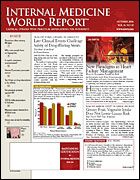PROActive: Diabetes Drug Prevents Recurrent Stroke in High-Risk Patients
From the World Congress of Cardiology
Barcelona—The glucose-lowering drug pioglitazone (Actos) also reduces the risk of recurrent (but not first) stroke in patients with type 2 diabetes who are at high risk for cerebrovascular events, said Robert George Wilcox, MD, professor, Department of Cardiovascular Medicine, Queen’s Medical Centre, University Hospital, Nottingham, United Kingdom, at the 15th World Congress of Cardiology.
The finding is from a subgroup analysis of the Prospective Pioglitazone Clinical Trial in Macrovascular Events (PROactive), in which 5238 patients with type 2 diabetes and macrovascular disease were randomized to pioglitazone, 45 mg/day, or placebo, in addition to standard-of-care therapies.
P
P
As reported earlier this year, pioglitazone did not significantly reduce the primary end point—a composite of 7 macrovascular events (10% reduction; = .095)—but it did result in a significant 16% reduction ( = .027) in the combined secondary end point of death, myocardial infarction (MI), and stroke.
Compared with placebo, pioglitazone was also associated with improvements in hemoglobin (Hb) A1c, blood pressure, triglycerides, and high-density lipoprotein cholesterol levels.
Dr Wilcox noted that type 2 diabetes is known to increase the risk of morbidity and mortality from cerebrovascular disease, but the benefits of glucose lowering in patients with diabetes and a history of stroke had not been known.
The analysis presented at the meeting looked at the incidence of stroke in the 984 patients who entered the trial with a history of stroke and the 4254 patients who had no history of stroke when the study began.
P
During an average of 34 months of treatment, the incidence of stroke in the group with previous stroke was 10.2% in the placebo group and 5.6% in the pioglitazone group, corresponding to a 47% reduction ( = .009) in risk of second stroke, said Dr Wilcox.
P
In addition, the composite of cardiovascular (CV) death, MI, or stroke was reduced by 28% in patients with a history of stroke who were assigned to pioglitazone relative to placebo ( <.05).
The incidence of a first stroke was 2.6% and 2.8% in the placebo and pioglitazone groups, respectively, a nonsignificant difference. The 14% reduction in the combined end point of CV death, MI, and stroke in pioglitazone-treated patients also did not reach statistical significance.
More patients in the pioglitazone group were hospitalized with clinical features consistent with heart failure, said Dr Wilcox, but mortality was not increased in this group. The rate of all-cause death was similar in both groups, regardless of stroke history status.
Lars Rydén, MD, of the Karolinska Institutet, Stockholm, noted the lack of a biologic explanation for the different findings in the patients with and without a history of stroke, given that changes in biomarkers such as HbA1c, blood pressure, and lipids were similar in those with and without a history of stroke.
Key points
In patients with diabetes, pioglitazone cut the risk of recurrent stroke in half.
It also reduced the composite of CV death, MI, or stroke in patients with a history of stroke.
The drug was associated with improvements in HbA1c, blood pressure, triglycerides, and high-density lipoprotein cholesterol.
